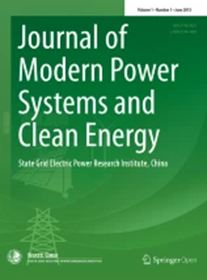Hybrid Local-Global Power-Sharing Scheme for Droop-Free Controlled Microgrids
IF 6.1
1区 工程技术
Q1 ENGINEERING, ELECTRICAL & ELECTRONIC
Journal of Modern Power Systems and Clean Energy
Pub Date : 2024-04-18
DOI:10.35833/MPCE.2023.000652
引用次数: 0
Abstract
The droop-free control adopted in microgrids has been designed to cope with global power-sharing goals, i. e., sharing disturbance mitigation among all controllable assets to even their burden. However, limited by neighboring communication, the time-consuming peer-to-peer coordination of the droop-free control slows down the nodal convergence to global consensus, reducing the power-sharing efficiency as the number of nodes increases. To this end, this paper first proposes a local power-sharing droop-free control scheme to contain disturbances within nearby nodes, in order to reduce the number of nodes involved in the coordination and accelerate the convergence speed. A hybrid local-global power-sharing scheme is then put forward to leverage the merits of both schemes, which also enables the autonomous switching between local and global power-sharing modes according to the system states. Systematic guidance for key control parameter designs is derived via the optimal control methods, by optimizing the power-sharing distributions at the steady-state consensus as well as along the dynamic trajectory to consensus. System stability of the hybrid scheme is proved by the eigenvalue analysis and Lyapunov direct method. Moreover, simulation results validate that the proposed hybrid local-global power-sharing scheme performs stably against disturbances and achieves the expected control performance in local and global power-sharing modes as well as mode transitions. Moreover, compared with the classical global power-sharing scheme, the proposed scheme presents promising benefits in convergence speed and scalability.无骤变受控微电网的本地-全局混合电力共享方案
微电网中采用的无垂控制旨在实现全局功率共享目标,即在所有可控资产之间共享干扰缓解,以均衡其负担。然而,受邻近通信的限制,无骤变控制中耗时的点对点协调会减缓节点向全局共识的收敛,从而随着节点数量的增加而降低功率共享效率。为此,本文首先提出了一种局部功率共享无垂控制方案,以控制附近节点内的干扰,从而减少参与协调的节点数量,加快收敛速度。然后,本文提出了一种本地-全局混合功率共享方案,以充分利用这两种方案的优点,该方案还能根据系统状态在本地和全局功率共享模式之间自主切换。通过优化稳态共识以及通往共识的动态轨迹上的功率共享分布,利用最优控制方法得出了关键控制参数设计的系统指导。通过特征值分析和 Lyapunov 直接法证明了混合方案的系统稳定性。此外,仿真结果验证了所提出的本地-全局功率共享混合方案能稳定地对抗干扰,并在本地和全局功率共享模式以及模式转换中实现了预期的控制性能。此外,与经典的全局功率共享方案相比,所提出的方案在收敛速度和可扩展性方面都有很大的优势。
本文章由计算机程序翻译,如有差异,请以英文原文为准。
求助全文
约1分钟内获得全文
求助全文
来源期刊

Journal of Modern Power Systems and Clean Energy
ENGINEERING, ELECTRICAL & ELECTRONIC-
CiteScore
12.30
自引率
14.30%
发文量
97
审稿时长
13 weeks
期刊介绍:
Journal of Modern Power Systems and Clean Energy (MPCE), commencing from June, 2013, is a newly established, peer-reviewed and quarterly published journal in English. It is the first international power engineering journal originated in mainland China. MPCE publishes original papers, short letters and review articles in the field of modern power systems with focus on smart grid technology and renewable energy integration, etc.
 求助内容:
求助内容: 应助结果提醒方式:
应助结果提醒方式:


